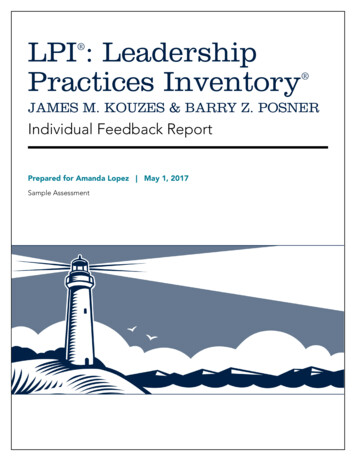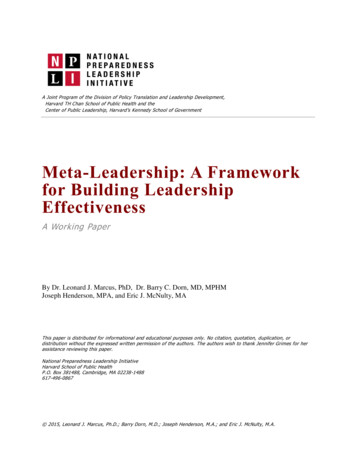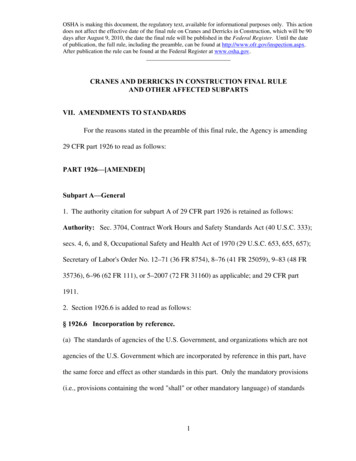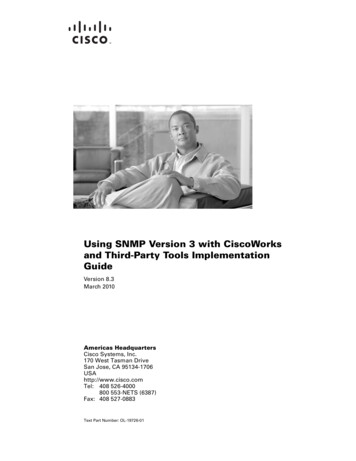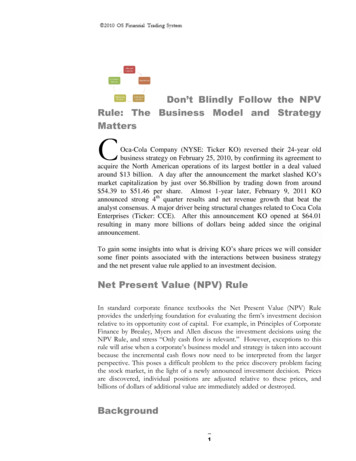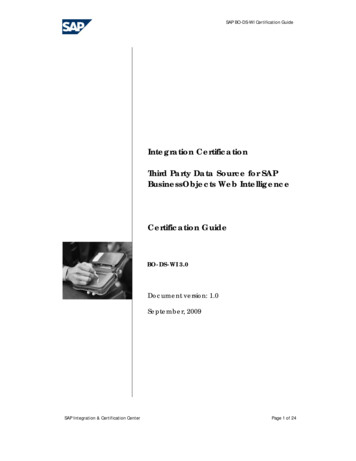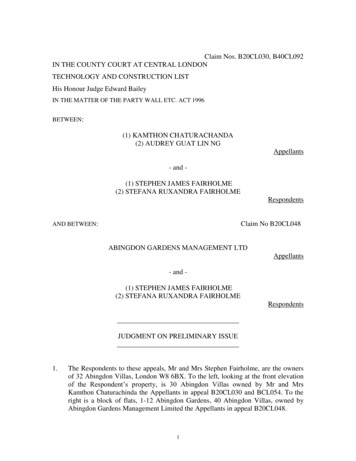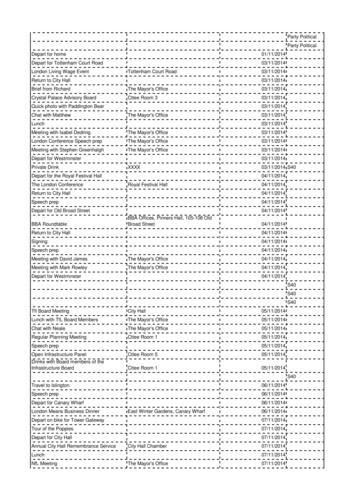
Transcription
PARTY LEADERSHIP AND RULE OF LAW IN THE XI JINPING ERAWHAT DOES AN ASCENDANT CHINESE COMMUNIST PARTY MEANFOR CHINA’S LEGAL DEVELOPMENT?JAMIE P. HORSLEYSEPTEMBER 2019EXECUTIVE SUMMARYjournalists, and ethnic and religious minorities — mostblatantly in Xinjiang11 and Tibet.12 The crackdown hasalso targeted outspoken academics13 and students,14as well as the legal profession that the party purportsto entrust15 to protect the public’s lawful rights andhelp achieve law-based governance. In practice, theparty maintains a dual16 state and legal system, underwhich the majority of Chinese people generally enjoythe protection of an increasingly sophisticated body oflaw and legal institutions, but those deemed a dangerto the party-state are handled outside the law.The Chinese Communist Party has largely observed atechnical, de jure separation between itself and thestate, including the legal system — even while de factocontrolling the state apparatus and often disregarding1and devaluing the law — for much of the 70 yearsit has ruled the People’s Republic of China (PRC).Party General Secretary Xi Jinping is dismantling thatpretense through assertion of comprehensive partyleadership2 over everything, including law. Yet, hispush to codify party leadership into law and makingexplicit the party’s command of “socialist rule oflaw with Chinese characteristics”3 suggest that Xiappreciates the legitimating power of law. Underhis incumbency, the party has made “governing thecountry in accordance with law,”4 commonly translatedas “law-based governance” (依法治国), a cornerstoneof the party’s governance strategy, along with Xi JinpingThought on Socialism with Chinese Characteristics fora New Era.5 The party, while demanding “absolute”6leadership of political-legal work, continues to delegateto state legal institutions the responsibility to addressand resolve complex matters on a day-to-day basis ina professional, efficient, fair, and autonomous mannerto help maintain social stability and promote economicdevelopment.“The party maintains a dual stateand legal system, under whichthe majority of Chinese peoplegenerally enjoy the protection of anincreasingly sophisticated body oflaw and legal institutions, but thosedeemed a danger to the party-stateare handled outside the law.The substantive impact of Xi’s push to institutionalizeand legalize party leadership over everything isnot clear. To date, the party appears to view itsleadership as primarily political and seeks topromote a professionalized, efficient, and effectivestate, economy and legal sector. It is sending mixedmessages, however. Emphasizing party leadershipraises concerns about increased politicizationof decisionmaking, with less transparency andaccountability, potentially threatening not onlyAt the same time, the authoritarian party-statecontinues to bypass state legal requirements,7 oradopts8 and applies illiberal ones,9 when dealing withwhat it views as sensitive matters. Relying on extralegal detentions10 and other coercive measures, Xi hasoverseen an unprecedentedly organized and sustainedcrackdown on civic and labor activists, religious leaders,DOMESTIC INSTITUTIONS AND FOREIGN POLICY1
GLOBAL CHINAPARTY LEADERSHIP AND RULE OF LAW IN THE XI JINPING ERAeconomic and social development, but also the rule-oflaw project that is intended to enhance party legitimacy.The party’s conditional attitude toward law, reflectedin its continued resort to extra-legal means in dealingwith perceived enemies, creates uncertainty over thereliability of the party-state’s legal commitments bothat home and abroad.that the party must “act within the framework of thecountry’s constitution and the law”; preserve the“organic unity of Party leadership, the running of thecountry by the people, and law-based governance”;develop a socialist rule-of-law system with Chinesecharacteristics and build a socialist rule-of-law country;respect and safeguard human rights; and bring allstate work under the rule of law.THE PARTY’S RELATIONSHIP TOSTATE LAWThe charter’s main body more specifically requiresparty members to have legal knowledge, set a goodexample in abiding by — and assisting their workunits to abide by — laws and regulations, and handlematters in accordance with law. It forbids using againstparty members any measure that violates the law orthe party charter, while requiring that any offendingorganizations and individuals be held accountableaccording to law, as well as party discipline. Partymembers who seriously violate criminal law must beexpelled.Under China’s one-party system, the relationship of theparty with state law and the legal system is complexand characterized by contention and duality. Theparty has always exercised de facto control of stateaffairs, through a variety of mechanisms includingpersonnel appointments and party organizations thatparallel and intertwine with the state structure. Butits constitutional and legal status17 have generallybeen left ambiguous.18 The interplay of formal (legal)as opposed to informal (societal) ordering thatcharacterized traditional Chinese thought19 and therevolutionary period20 prior to the PRC’s establishmentin 1949 is evident in the contemporary juxtaposition offormal state law on the one hand, and extra-legal — butincreasingly ordered and more broadly applicable —party regulations on the other. These target ideologicaland organizational matters, as opposed to strictlylegal behavior, and may be used to justify extra-legalcoercive measures for “sensitive” or “exceptional”21cases.On the state side, the preamble to the stateconstitution25 (宪法) — the making26 and amending ofwhich is controlled by the party27 — has always extolledthe party’s historical and political leadership. However,in keeping with Soviet law traditions from which theinitial 1954 constitution drew,28 the party was notmentioned in its main body for most of PRC history,save for the short-lived 1975 and 1978 constitutionsthat constitutionalized party leadership and Chinesecitizens’ obligation to support it. Indeed, theconstitution has stipulated since 1982, post-Openingand Reform, that everyone, including “all politicalparties,” must abide by the constitution and that no“organization or individual is privileged to be beyondthe Constitution or the law.” Even while the party underXi has denounced Western-style constitutionalism,29 Xireaffirmed this language in his October 2017 reportto the 19th Party Congress,30 and it remains in theconstitution as revised in March 2018.Following the violent and lawless Cultural Revolutionpolitics of 1966-76, the party under Deng Xiaopingdetermined in December 197822 to establish amodern legal system to facilitate social and economicdevelopment, including foreign trade and investmentunder its Opening and Reform policy, and preventa return to arbitrary one-man rule. Since then,“legalization” has been intertwined23 with China’spolitical, economic, and social modernization.Seemingly contradicting the party’s leading position,Xi elaborated in that report on the supremacy of theconstitution and law. He advocated for increasingpublic awareness of “the principle underlying ruleof law that the Constitution and the law are aboveeverything else and that everyone is equal beforethe law.” He reminded fellow party members that “noorganization or individual has the power to overstepThe party’s organizational charter (章程, which ittranslates as its constitution24 but will be calledthe “charter” here to distinguish it from the stateconstitution), has since 1956 required partyorganizations and members to abide by state law. Thecharter as last revised in October 2017 by the 19thParty Congress currently stipulates in its preambleDOMESTIC INSTITUTIONS AND FOREIGN POLICY2
GLOBAL CHINAPARTY LEADERSHIP AND RULE OF LAW IN THE XI JINPING ERAINTRAPARTY REGULATIONSthe Constitution or the law; and no one in a position ofpower is allowed in any way to override the law with hisown orders, place his authority above the law, violatethe law for personal gain, or abuse the law.” In sodoing, Xi appeared to accord the Chinese term officiallytranslated as “rule of law” (法治) a meaning similar tothe Western notion that public as well as private poweris constrained by law. However, the party’s concept isintertwined with the more complex notion of “socialistrule of law with Chinese characteristics”: State lawreflects the will of the party codified through statelegislative processes, and the party thus abides by thelaw it creates.31“Law-based governance” means not only governingin accordance with the constitution and law, but alsothat the party and its members are strictly governedby the party’s own intraparty regulations38 (党内法规)that dictate ideological, organizational, and operationalbehavior. Indeed, the party under Xi views regulationbased party governance (依规治党) as a precondition39for good state governance. The party’s charter is themost fundamental intraparty regulation.The intraparty regulation system has been linked withXi’s vow to restrain “power in a cage of regulations.”40“One must build a good cage,” Xi instructed: “If thecage is too loose, or is very good but the door is notclosed, and one is free to go in and out, then that isof no use.”41 The party, like the State Council it leads,recently amended its own rulemaking and archivalregulations,42 — reportedly referred to collectively asthe party’s “legislation law”43 — and introduced the useof five-year44 rulemaking plans,45 similar to the fiveyear lawmaking agendas46 formulated by the NationalPeople’s Congress (NPC) Standing Committee andannual ones47 compiled by state bodies. The partynow requires licensed lawyers to advise both party andstate organs48 on rulemakings and major decisions.It also undertook the first comprehensive review ofits regulations and continues49 to “clean up” andsupplement them, again analogous to the periodicrectification (清理) of state regulations.50 Xi’s rewritingof the party rulebook51 exceeds that of his predecessorsand is centralizing and personalizing party authority.52The 1982 decision to return to the socialist conventionthat Deng favored — of not mentioning the party inthe constitution’s main text — reportedly reflected32 arecognition among some party leaders that, since partymembership constitutes a minority of the Chinesecitizenry (roughly 6% currently), it was more legitimatefor the party to operate informally. The current CentralCommittee, which Xi leads, apparently disagreed,when it decided33 to write party leadership into Article1 of the constitution’s main body as the “definingfeature of socialism with Chinese characteristics.”That March 2018 amendment,34 providing the partywith formal constitutional status, together with acompanion amendment establishing a new branchof government to consolidate the party’s anticorruption35 efforts and a massive reorganization thatmerged an array of party and state entities, reflects afundamental turn toward integration of the party withthe state and state law. This is being carried out inseveral ways: strengthening the quasi-parallel body ofintraparty regulations; increasing party or joint partystate regulation that encroaches into areas formerlyoccupied primarily by state law; writing the party’s rolein state governance expressly into state law; mergingselected state bodies with their party counterparts,thus removing them from the reach of state law andremedies; and emphasizing party-building and therole of party organizations in all public and privateentities. This institutionalization and legalization ofparty leadership36 is a major shift under Xi. While thepractical impact37 is not clear, it raises concerns overofficial accountability, transparency, and the entirerule-of-law project more generally.Intraparty regulations are not simply a parallel systemonly impacting the 90 million party members.53 Under Xi,they increasingly have been jointly issued with the StateCouncil or regulate areas formerly managed by the state.Jointly issued regulations traditionally focused primarilyon managing officials in party and state organs,54 whereparty members constitute55 80% of civil servants and95% of leading officials. Their scope has been extendedto also address such issues as law-based government,56statistical fraud,57 and environmental protection.58 Inother cases, party-dominated dual-facing entities likethe Cyberspace Administration of China59 — otherwiseknown as the Office of the Central Cyberspace AffairsCommission established under Xi in 2014 — issue staterules60 in their state capacity.DOMESTIC INSTITUTIONS AND FOREIGN POLICY3
GLOBAL CHINAPARTY LEADERSHIP AND RULE OF LAW IN THE XI JINPING ERAThe party also issues policy documents called“opinions,” “decisions,” “plans,” or “notices,” oftenjointly with the State Council. The number of partyand joint party-State Council policy documents hasalso increased under Xi. They cover everything fromlegal services,61 private enterprise financing,62 socialcredit,63 education,64 food safety,65 government workinspections,66 and more. Such documents oftenprovide the policy basis for subsequent legislation andare sometimes cited as the direct basis — rather thana law — for government rules.the party’s leadership role was similarly codified inthe 2014 Counter-Espionage Law,82 2015 NationalSecurity Law,83 2017 National Intelligence Law,84 and2018 Supervision Law85 targeting anti-corruption.Some of these laws delegate to party entities certainpolicy and oversight functions, as would the draftEncryption Law,86 as well. State Council VolunteerService Regulations87 require party organizations beestablished in and provided necessary conditionsby volunteer organizations, while draft 2018 privateschool88 regulations would further require that partyorganizations participate in major decisionmaking andpolicymaking bodies.Jointly issued party-State Council regulationsare considered intraparty regulations and thusexempted67 from participation68 and transparency69requirements applicable to state legislation. Thecontinued institutionalization of open government70mechanisms like access to government records andpublic participation in government decisionmaking,which Chinese citizens and civic organizations71 use toengage with the state, is one of the most significantChinese legal reforms of the last 40 years. The partyis subject, instead, to the less rigorous requirementsfor party rulemaking72 and transparency.73 While ithas selectively improved public disclosure, includingof meetings74 and activities, the party has publishedonly half of hundreds of documents reportedlyapproved through June 2019 by the party’s DeepeningReform75 and Law-Based Governance76 Commissionsestablished under Xi. Moreover, although certainparty decisions can be challenged internally, the partycannot be held accountable to the general public likestate agencies, which may be sued77 for failure toperform statutory obligations, including informationdisclosure.78Three recent sets of State Council procedures — onformulating administrative regulations,89 governmentrules,90 and government decisionmaking91 onmajor policies and projects — not only specify partyleadership but also require certain party consents fordesignated documents, including annual rulemakingplans and major project catalogues, and whenfinalizing important documents. Party oversight isnot new,92 but is now more explicit. However, similarto NPC lawmaking, enhanced party leadership inState Council rulemaking and decisionmaking93 isaccompanied by requirements for greater expert input,transparency, and public participation, including 30day public comment periods for drafts, which increasegovernment accountability to the public.More worrisome is the specific grant of state powersto the party for the first time94 since the CulturalRevolution, under the 2015 National Security Law. Thatlaw authorizes the party’s secretive National SecurityCommission95 — established in 2013 and chaired byXi96 — to, among other things, deploy state emergencymeasures when national security is endangered.LEGALIZING THE PARTY’S ROLEWHAT DOES PARTYLEADERSHIP MEAN?In addition to constitutionalizing party leadership andusing intraparty regulations to regulate state matters,the party’s leadership role — and obligations relating tothe party — are increasingly being written into laws andregulations. China’s 2000 Legislation Law79 was thefirst law to specifically mention the party,80 providingthat legislation should adhere to party leadership.China’s Company Law81 has stipulated since 2005that party organizations should be established in allcompanies, which are to “provide necessary conditions”for party organization activities. Since Xi took office,Up until 2017, the party charter’s preamble definedparty “leadership” to mean “mainly political,ideological and organizational leadership,” whichofficial sources97 explained meant that the “Partydoes not take the place of the government in thestate’s leadership system.” The 2017 charter replacedthat definition with a more expansive but imprecisedescription of party leadership as “the most essentialDOMESTIC INSTITUTIONS AND FOREIGN POLICY4
GLOBAL CHINAPARTY LEADERSHIP AND RULE OF LAW IN THE XI JINPING ERAattribute of socialism with Chinese characteristics,and the greatest strength of this system,” adding thatthe “Party exercises overall leadership over all areas ofendeavor in every part of the country.”procuratorate, and legal profession initiatives. The 19thParty Congress endorsed108 setting up yet another LSG,for “advancing law-based governance in all areas,” toprovide unified party leadership over the rule-of-lawinitiative and ensure “scientific lawmaking, strict lawenforcement, impartial administration of justice andobservance of the law by everyone.”The Politburo has justified98 party leadership asconsistent with the rule of law, since only party leadershipcan properly advance law-based governance. Whereasmost Xi-era documents refer to the party’s “overall,”“authoritative,” and “centralized, unified” leadership, aJanuary 2019 intraparty regulation99 requires politicallegal units to follow the party’s “absolute” leadershipand align law-based governance of the country withintraparty regulation-based governance of the party.It is not clear what “absolute leadership” — alsorequired of the military100 — means in the context ofpolitical-legal work, which is carried out by the courtsand procuratorates, as well as public security,101 statesecurity, and justice authorities. The party explicitlymaintains102 that judicial institutions must exercisetheir power in an independent and fair manner in linewith the law, and the party has prohibited103 leadingofficials from interfering in specific cases upon threatof disciplinary and criminal liability. Many documents,including Xi’s 19th Party Congress report,104 suggestthat party leadership is still intended to be primarilypolitical and that state entities — including the politicallegal bodies — continue to be expected to perform theirfunctions autonomously and professionally.These two LSGs were elevated to commission statusin the 2018 party and state restructuring that alsomerged109 a number of party and state bodies. Theparty’s institutional reform decision110 — ostensiblyto achieve greater efficiency and coordination111 andmodernize governance112 — along with its restructuringplan113 significantly expand regulation by or under thedirection of more opaque party bodies. Regulation offilm, news media, and publications was given solelyto the party Central Propaganda Department,114 whilemanaging overseas Chinese, as well as religious andethnic affairs, moved directly under the party’s UnitedFront Work Department.115 The Party OrganizationDepartment,116 which appoints senior party and stateofficials, picked up sole jurisdiction over public-sectorreform and China’s civil service.117 The Legislative AffairsOffice, formerly charged with drafting laws and nationalregulations, was removed from the State Council, andits functions dispersed and merged with the Ministry ofJustice, which also now houses the party’s Central Lawbased Governance Commission118 office, directed bythe head of the party’s Central Political and Legal AffairsCommission.119 The National Academy of Governance,which trains government officials, moved into theCentral Party School,120 which trains party cadres.The party has historically exercised its leadership invarious ways, often behind cover of the state, usingstate legal processes to convert its decisions into stateaction. It continues to lead administrative, judicial,legislative, and other work through the appointmentof party members to leadership positions in thoseinstitutions, through party organizations embedded inthem, and through intraparty regulations.This restructuring also followed moves under Xi forthe party to take more direct charge in importantareas through establishing new institutions, like theparty National Security Commission,121 tasked withpolicymaking and certain state powers; the CentralCyberspace Affairs Commission headed by Xi, theoffice of which doubles122 as the state CyberspaceAdministration of China;123 and the National SupervisionCommission (NSC),124 co-located and merged withthe powerful party Central Commission for DisciplineInspection.125The party — like the State Council — has also longformed leadership small groups (LSGs), comprisedof high-level party members from relevant bodies, tocollectively tackle specific issue areas such as finance,cybersecurity, and foreign affairs. The number ofthese, often headed by Xi himself, has proliferated105under Xi. The 2013 Party Plenum106 established aComprehensively Deepening Reform LSG headed byXi, under which a sub-group devoted to judicial reformhelped push through a series of significant107 court,Creation of the NSC126 — approved by the party andaccorded constitutional status and its own organic lawby the NPC in March 2018 — was intended to legalize127DOMESTIC INSTITUTIONS AND FOREIGN POLICY5
GLOBAL CHINAPARTY LEADERSHIP AND RULE OF LAW IN THE XI JINPING ERAthe party’s ongoing anti-corruption campaign, as wellas expand it beyond party members to all publicpersonnel who exercise public power. Instead, theNSC epitomizes the legal challenges arising from theintegration of party and state bodies more generally.Such merged or co-located bodies, dominated by theirparty counterparts, potentially lie outside the reachof state criminal and administrative law — includingChina’s transparency and due process requirementsfor imposing obligations and penalties — and anyjudicial review of their actions. Party leadershipexercised through this kind of party-state functionalintegration, which has increased under Xi, goes beyondpolitical leadership and places nominally state actionoutside the law on which both party and state actionare to be based.decisionmaking,134 in order to help improve SOEefficiency and productivity. Moreover, a recent partyregulation requires leading party members in centralSOEs to hold board and other management positionsand first decide major economic and managementmatters, before the board or management groupmakes a final decision.SOEs that have foreign investors135 have beenpressured to make similar adjustments. More than 30Hong Kong-listed SOEs136 had reportedly written theparty’s role into their charters as of September 2017.This more assertive policy on party involvement incorporate decisionmaking raises concerns137 amongforeign business partners, particularly since the partycurrently emphasizes political integrity of its officialsover competence.138Party leadership is also exercised through specific tasksof central, local- and primary-level party organizationsin state organs, the courts and procuratorate, partyled people’s organizations, state-owned and privateenterprises, social organizations, law firms,128 andother non-party entities. The party charter has longcalled for primary-level party organizations to beestablished whenever an entity has three or moremembers. Party-building through strengtheningprimary-level party organizations is a priority for Xi.To date, this party “legalization” requirement hasnot been formally imposed on non-SOE companies.Although all Chinese companies, including private andforeign-invested ones, have been legally required139since 2005 to establish and provide “necessaryconditions” for party organizations, recent laws140 andpolicies141 relevant to private companies (includingthe Foreign Investment Law,142 adopted March 2019)make no mention of the party or party organizations.Moreover, the 2017 charter tasks party organizationsin “non-public economic organizations” to carry outparty policies and ensure observance of law andhealthy enterprise development, but does not stipulateparty leadership or require party participation indecisionmaking.The party is pushing to give party-building “legalstatus” (法定地位) of a sort. For example, a 2016 jointparty-State Council instruction129 calls for “inclusion ofParty building in the charters of social organizations”and stipulates that such party organizations shouldprovide opinions on major decisions, importantactivities, large expenditures, and foreign-relatedactivities. Draft 2018 regulations130 would implementthese instructions by requiring social organizations, asa matter of law, to establish party organizations andinclude party-building commitments in their charters.Earlier proposals by the party-state to purchase“special management shares”143 in private technologycompanies and secure a board seat appear notto have gone forward. The party must balance itsdesire for control against providing necessary spacefor the innovation so vital for economic growth. Itacknowledges that the private sector contributes144over 50% of taxes, 60% of domestic gross domesticproduct (GDP), 70% of technical innovation, and 80%of urban labor employment. Indeed, the number ofparty committees in private companies appears tohave decreased from 2017 to 2018. Nonetheless, theinformal push for party-building in145 — and writing theparty into legal documents of146 — private companiescontinues.147The party also requires, as a matter of policy131 ratherthan law, enhanced legal status for party organizationsin state-owned enterprises (SOEs), over 90%132 ofwhich host such organizations. The charter has longordered party organizations to participate in majordecisionmaking of SOEs and collective enterprises. In2017, the State Council directed133 SOEs to clarify intheir articles of association the legal status of partyorganizations, including their right to participate inDOMESTIC INSTITUTIONS AND FOREIGN POLICY6
GLOBAL CHINAPARTY LEADERSHIP AND RULE OF LAW IN THE XI JINPING ERAXi has given seemingly conflicting interpretations ofwhat strengthened party leadership of SOEs148 means.He has advocated that SOEs are important forces toimplement party decisions, enhance economic andsocial development, and realize major strategies suchas his signature Belt and Road Initiative.149 But he alsoindicated that party organizations in SOEs should “aimto improve corporate profitability, competitiveness andthe value of state assets.”The 2017 charter does stipulate the party mustensure that state legislative, judicial, administrative,and supervisory organs work independently andresponsibly. Party organizations in state organsshould assist and supervise chief administrators,but specifically may not lead the organs’ professionalwork. The party continues to professionalize thelegislative process and strengthen the regulatory stateand its accountability, through greater transparencyin decisionmaking, enforcement, and adjudication.Thus, exercise of party leadership in the legislativeand rulemaking arena may, in practice, prove to besomewhat akin to the Office of Management andBudget’s role in reviewing significant U.S. federalagency action to ensure it is consistent with presidentialpolicy priorities. And the principle that the courts andprocuratorates should handle cases independently156was maintained in the constitution’s 2018 revisionsand relevant laws,157 and is enforced through a partyregulation158 requiring reporting of and discipline forinterference by leading officials in judicial cases.From a foreign investor’s perspective, requiring SOEs, theirjoint ventures with foreign companies, and potentiallyprivate companies with which they might deal to formalizethe role of their party organizations raises concerns overwhether party-state priorities might interfere with normalprofit-seeking goals.150 Another key concern is whetherexplicitly requiring party representatives to approvemajor decisions before submitting them to the board ofdirectors, which is a company’s highest decisionmakingbody, might compromise the board’s fiduciary obligations,without any corresponding party accountability.151The push to legalize party decisionmaking authority incompanies further blurs the line152 between the partyand the market, as well as the party and the state,and could compound the difficulty of convincing othergovernments and investors to treat Chinese SOEs andprivate companies as independent market entities.“It is concerning.that party leadershipis encroaching increasingly on thenormal state and legal system.IMPLICATIONS OF PARTYLEADERSHIP AND ITSLEGALIZATIONIt is concerning, however, that party leadership isencroaching increasingly on the normal state and legalsystem. It portends not only increased politicization atthe expense of professionalism, but also decreasedstate transparency and less opportunity for theChinese public to exercise the participation and orderlycontestation procedures for restraining state actionthat the PRC legal system increasingly affords.159 Thistrend may well threaten the party’s decades’-long effortto foster the rule of law and law-based governance thatit hopes will bolster its legitimacy.Some commentators153 have argued that Xi’sune
Sep 30, 2019 · leadership as primarily political and seeks to promote a professionalized, efficient, and effective state, economy and legal sector. It is sending mixed message

